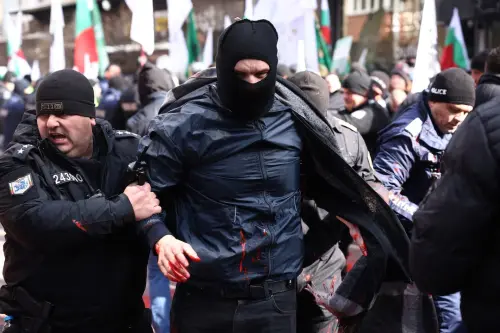Several thousand supporters of Bulgaria's ultra-nationalist Revival party clashed with police on Saturday while attempting to overrun the building of a European Union mission in Sofia. The protest was against Bulgaria's upcoming plans to adopt the euro next year.
The demonstrators, chanting "Resignation" and "No to the Euro," hurled red paint, firecrackers, and Molotov cocktails at the EU building, igniting the front door before being dispersed by the police.
Approximately 10 police officers sustained minor injuries, and around six individuals were detained, according to a senior police official who spoke to the media following the demonstration.
The government denounced the assault on the EU buildings, declaring in a statement that such acts "are unacceptable and contradict the principles of the rule of law."
The protests initiated in front of the European Central Bank, with demonstrators burning effigies of ECB President Christine Lagarde and other officials. Some carried Bulgarian, Soviet Union, or East German flags, while others brandished signs saying "We don't Want the Euro."
Speaking to the media, Revival party chairman Kostadin Kostadinov expressed, "We don't want Bulgarian financial independence to be destroyed. We want to keep the Bulgarian lev. We are here to defend our freedom."
Although Bulgaria's new government, established after a snap election in October and the seventh in four years, has affirmed the country's intention to join the eurozone next year, concerns remain.
Prime Minister Rosen Zhelyazkov announced that the 2025 state budget will feature a deficit of about 3%, facilitating the euro's introduction on January 1, 2026. However, the country still needs to meet an extended inflation target before its bid can be assessed.
Bulgarians hold divided opinions on the euro's introduction, with many fearing potential price increases akin to past instances.
Revival has accused the central bank and the national statistics agency of "fabricating data" to enable the euro's introduction, calling for a comprehensive public debate on its economic consequences.
Economists contend that Bulgaria, the EU's poorest member state with its currency pegged to the euro, could attract more foreign investment and secure credit rating upgrades by adopting the single currency, thus reducing debt financing costs.
